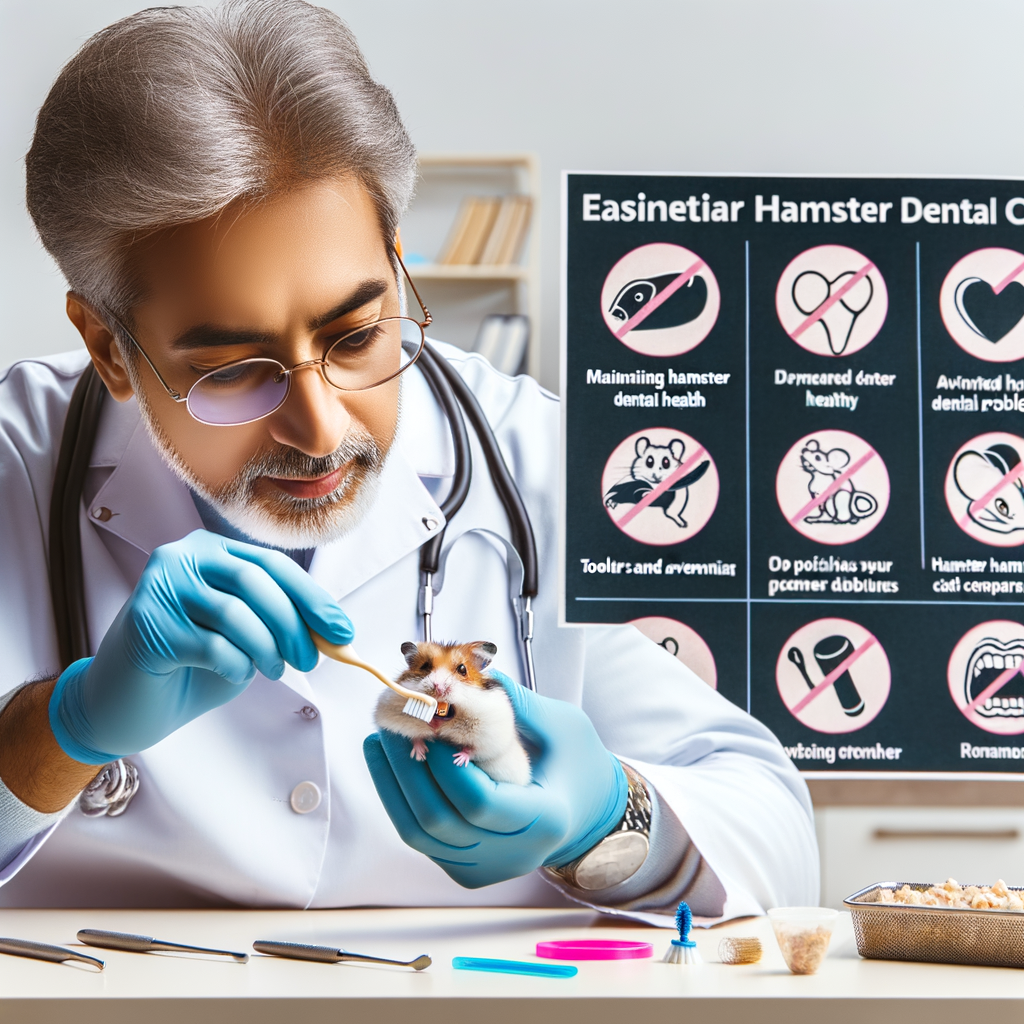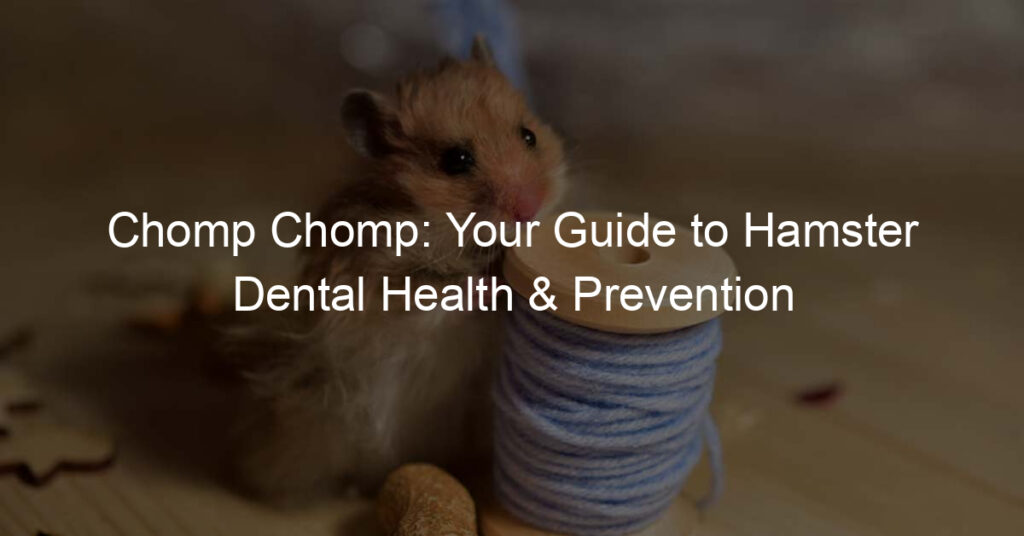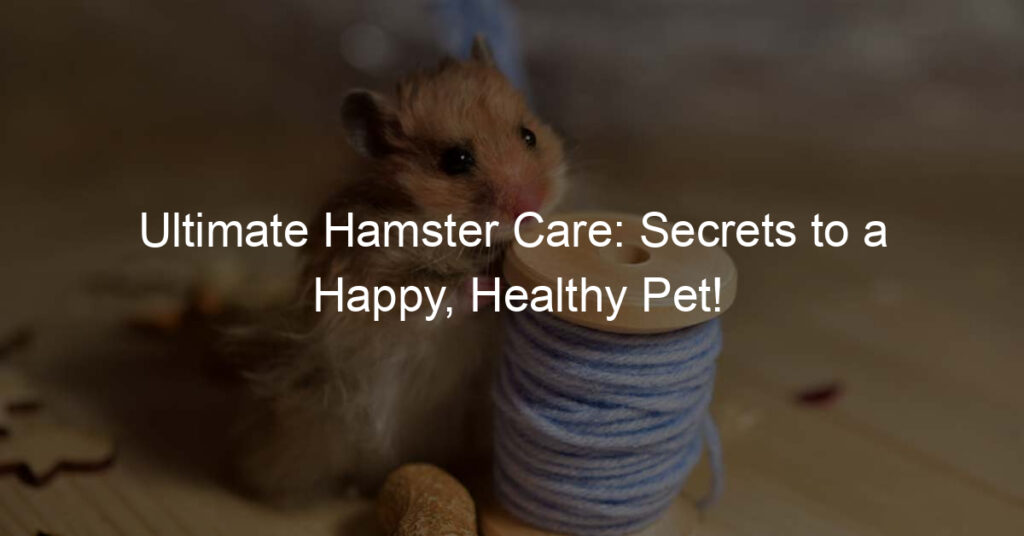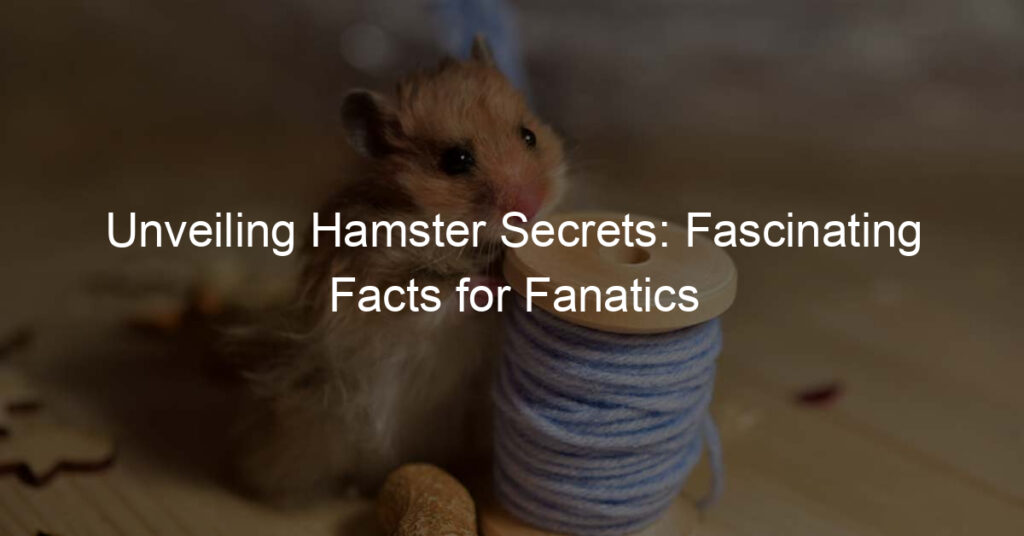
Introduction to Hamster Dental Health
When it comes to the health and happiness of our furry friends, every detail matters. This includes their dental health. Hamsters, just like humans, require regular dental care to prevent diseases and ensure overall well-being. In this section, we will discuss the importance of dental health in hamsters and address some common misconceptions about hamster dental care.
- Importance of dental health in hamsters
- Common misconceptions about hamster dental care
Hamsters have a unique set of teeth that never stop growing. This makes their dental health crucial for their survival. If a hamster’s teeth become too long, they can cause discomfort, difficulty in eating, and even serious health issues. Regular monitoring and care can help keep your hamster’s teeth at a healthy length and prevent these problems.
Many people believe that hamsters can take care of their dental health on their own. While it’s true that hamsters naturally grind their teeth by chewing, this isn’t always enough to maintain optimal dental health. Another misconception is that all hamsters need the same type of dental care. However, the dental care needs can vary depending on the breed of the hamster. Therefore, it’s important to understand your hamster’s specific needs and provide appropriate care.
In the following sections, we will delve deeper into understanding hamster teeth, how to prevent dental issues, common hamster dental diseases, and a comprehensive guide on hamster dental care. Our goal is to provide you with the knowledge and tools you need to ensure your hamster’s dental health is always at its best.
Understanding Hamster Teeth
Hamsters, like humans, have teeth that play a crucial role in their overall health. Understanding the basics of hamster dental care is essential for any hamster owner. Let’s dive into the details.
Basic Hamster Dental Care
Hamster dental care is not complicated, but it does require regular attention and care. Here are two key aspects to consider:
- How to care for hamster teeth
- Regular check-ups for maintaining hamster dental health
Hamster teeth care starts with a proper diet. Hamsters need to gnaw to keep their teeth from overgrowing, so providing chew toys and food that require gnawing, like carrots and other hard vegetables, is essential. Additionally, clean water should always be available to help keep their mouths clean.
Regular check-ups are crucial for maintaining your hamster’s dental health. These check-ups can be done at home by gently lifting your hamster’s lips to check their teeth. Look for signs of overgrown or broken teeth. If you notice any issues, it’s best to consult with a vet. Remember, prevention is always better than cure.
In conclusion, understanding and caring for your hamster’s teeth is a vital part of ensuring their overall health. By providing a proper diet and conducting regular check-ups, you can help prevent dental issues and keep your furry friend happy and healthy.
Hamster Teeth Problems
Hamsters, like other small pets, can experience various dental issues. It’s crucial to understand these problems to ensure your hamster maintains good oral health. Let’s explore some common hamster teeth problems.
- Overgrown Teeth
- Broken Teeth
- Malocclusion
Hamsters’ teeth continuously grow throughout their lives. If they don’t wear down their teeth by gnawing on hard materials, the teeth can become overgrown. Overgrown teeth can cause discomfort and difficulty eating. In severe cases, the teeth can grow into the hamster’s mouth or face, causing pain and infection.
Hamsters can break their teeth if they fall, fight with other hamsters, or chew on hard objects. A broken tooth can be painful and may prevent the hamster from eating properly. If you notice that your hamster has a broken tooth, it’s important to take it to the vet as soon as possible.
Malocclusion is a condition where the upper and lower teeth do not align properly. This can cause the teeth to grow in the wrong direction, leading to overgrowth and other dental problems. Malocclusion can be caused by genetic factors, injury, or improper diet. If left untreated, malocclusion can lead to severe health issues, including weight loss and infection.
Knowing these common hamster teeth problems can help you spot any issues early and seek veterinary care promptly. Remember, regular check-ups and proper dental care can prevent many of these problems and keep your hamster healthy and happy.
Preventing Hamster Dental Issues
One of the key ways to prevent dental issues in hamsters is through a proper diet. Let’s delve into the role of diet in maintaining your hamster’s dental health and the recommended foods for healthy teeth.
Diet and Hamster Dental Health
A balanced diet plays a crucial role in maintaining your hamster’s dental health. The right foods can help prevent dental diseases and ensure your hamster’s teeth remain strong and healthy.
- Role of diet in dental health
- Recommended foods for healthy teeth
Just like humans, hamsters need a balanced diet for their overall health, including their teeth. Hamsters are omnivores, meaning they eat both plants and meat. Their diet in the wild consists of grains, seeds, vegetables, and insects. This variety helps to keep their teeth in good shape. When a hamster chews, it helps to wear down their teeth, which continuously grow throughout their life. If a hamster’s teeth grow too long, it can lead to serious dental problems.
For healthy teeth, it’s recommended to feed your hamster a mix of commercial hamster food and fresh fruits and vegetables. Commercial hamster food usually contains seeds and grains, which are good for their teeth. Fresh fruits and vegetables, on the other hand, provide necessary vitamins and minerals. Some of the best foods for your hamster’s teeth include apples, carrots, broccoli, and cucumbers. Remember to cut the food into small pieces to prevent choking.
In conclusion, a balanced diet is essential for your hamster’s dental health. By providing a variety of foods, you can help keep your hamster’s teeth strong and prevent dental issues.
Chew Toys and Dental Health
Chew toys play a crucial role in maintaining your hamster’s dental health. They not only provide entertainment but also contribute significantly to oral hygiene. Let’s delve into the benefits of chew toys and how to select the right ones for your furry friend.
- Benefits of Chew Toys
- Teeth Trimming: Hamsters’ teeth grow continuously. Chew toys help in naturally grinding down their teeth, preventing overgrowth.
- Exercise: Chewing is a form of exercise for hamsters. It helps in strengthening their jaw muscles.
- Stress Relief: Chewing can also act as a stress reliever for hamsters, keeping them happy and healthy.
- Choosing the Right Chew Toys
- Material: Opt for chew toys made from safe, non-toxic materials. Wood is a popular choice. Avoid toys with sharp edges or small parts that can be a choking hazard.
- Size: The toy should be of a suitable size for your hamster. It should be big enough to chew on but not too large that it becomes difficult to handle.
- Interest: Choose toys that your hamster finds interesting. This will encourage them to chew more, promoting dental health.
Chew toys are more than just playthings for your hamster. They serve a dual purpose – entertainment and health. Here are some of the benefits:
Not all chew toys are suitable for your hamster. Here’s what you should consider when choosing chew toys:
In conclusion, chew toys are an essential part of your hamster’s dental health routine. They help in teeth trimming, provide exercise, and act as a stress reliever. However, ensure you choose the right chew toys that are safe, of the right size, and interesting to your hamster.
Hamster Dental Diseases
Hamsters, like humans, can also suffer from a variety of dental diseases. These conditions can cause discomfort and can lead to serious health issues if not treated promptly. In this section, we will discuss two of the most common dental diseases that affect hamsters: Gingivitis and Periodontal disease.
Common Dental Diseases in Hamsters
- Gingivitis: This is a common dental disease in hamsters. It is an inflammation of the gums caused by the buildup of plaque on the teeth. Symptoms of gingivitis in hamsters include red, swollen gums, and bad breath. If left untreated, it can lead to more serious conditions like periodontal disease.
- Periodontal disease: This is a serious gum infection that damages the soft tissue and can destroy the bone that supports your hamster’s teeth. It is usually the result of poor oral hygiene leading to a buildup of plaque and tartar on the teeth. Symptoms include loose teeth, bad breath, and difficulty eating. It is important to seek veterinary care if you suspect your hamster has periodontal disease.
Understanding these common dental diseases in hamsters is the first step towards ensuring your pet’s oral health. In the next section, we will discuss how these conditions can be treated and prevented.
Treatment and Prevention of Dental Diseases
Proper dental care is crucial for your hamster’s overall health. There are two main ways to ensure your hamster’s teeth stay healthy: professional dental care and home care.
- Professional Dental Care for Hamsters
Just like humans, hamsters can benefit greatly from professional dental care. Regular check-ups with a vet who specializes in small animals can help prevent dental diseases and catch any potential issues early on. These professionals have the right tools and knowledge to thoroughly clean your hamster’s teeth, removing any build-up that could lead to problems.
During these visits, the vet can also monitor the growth and development of your hamster’s teeth. Hamsters’ teeth never stop growing, so it’s important to ensure they’re wearing down properly. If not, your vet can trim them to prevent overgrowth, which can lead to pain and difficulty eating.
- Home Care Tips
Between vet visits, there are several things you can do at home to help maintain your hamster’s dental health. Here are a few tips:
- Provide the right food: Hamsters need a diet that helps wear down their teeth. This includes hard, crunchy foods like pellets and certain fruits and vegetables.
- Offer chew toys: Wooden blocks or other safe chew toys can help keep your hamster’s teeth at the right length.
- Monitor your hamster’s eating habits: If your hamster seems to be having trouble eating, it could be a sign of dental issues. Consult your vet if you notice any changes.
Remember, prevention is the best treatment. By providing professional dental care and practicing good home care, you can help ensure your hamster’s teeth stay healthy and strong.
Hamster Dental Care Guide
Keeping your hamster’s teeth healthy is crucial for their overall well-being. In this guide, we will walk you through a simple, step-by-step routine to ensure your hamster’s dental health is in top shape.
Step-by-step Dental Care Routine
Here are two important steps to follow in your hamster’s dental care routine:
- Inspecting your hamster’s teeth:
- Cleaning your hamster’s teeth:
Regular inspection is the first step in maintaining your hamster’s dental health. Hamsters’ teeth never stop growing, so it’s important to check them once a week. Look for signs of overgrown or misaligned teeth. Also, keep an eye out for any discoloration or breakage. If you notice any of these signs, it’s time to seek professional help.
Hamsters naturally clean their teeth by gnawing on hard objects. Providing chew toys made of safe wood or other hard materials can help keep their teeth clean and at the right length. Avoid using human toothpaste or brushes as they can be harmful to your hamster. Instead, you can use a clean, damp cloth to gently wipe their teeth if needed.
Remember, a healthy diet also plays a crucial role in your hamster’s dental health. Foods rich in fiber, like fresh fruits and vegetables, can help keep their teeth clean and healthy.
By following these steps, you can ensure your hamster’s teeth stay strong and healthy. However, if you notice any signs of dental issues, it’s best to seek professional help immediately.
When to Seek Professional Help
While it’s essential to maintain your hamster’s dental health at home, there are times when you need to seek the help of a professional. Let’s discuss the signs of dental problems and how to choose a vet for your hamster.
- Signs of Dental Problems
- Loss of appetite or difficulty eating
- Excessive drooling
- Swelling around the mouth or face
- Unusual behavior or signs of discomfort
- Overgrown or misaligned teeth
- Choosing a Vet for Your Hamster
- Find a vet who specializes in small animals or exotics. They will have the necessary experience and knowledge to handle your hamster’s dental health.
- Ask for recommendations from other hamster owners or pet stores.
- Check the vet’s credentials and reviews. Make sure they are licensed and have good feedback from previous clients.
- Consider the location and office hours. You want a vet who is easily accessible in case of emergencies.
Hamsters, like humans, can suffer from a variety of dental issues. It’s important to keep an eye out for signs that your hamster might be experiencing dental problems. These can include:
If you notice any of these signs, it’s time to seek professional help. A vet can provide a proper diagnosis and treatment plan to ensure your hamster’s dental health is restored.
Choosing a vet for your hamster is an important decision. You want to ensure that your pet is in the best possible hands. Here are some tips to help you make the right choice:
Remember, your hamster’s dental health is crucial for their overall well-being. Don’t hesitate to seek professional help when needed.
Conclusion: Maintaining Hamster Dental Health
As we wrap up this comprehensive guide on hamster dental health, it’s essential to remember that maintaining your hamster’s dental health is a continuous process. It’s not just about reacting to dental issues when they arise, but also about preventing them from happening in the first place.
- Recap of hamster dental care tips
- Understanding your hamster’s teeth: Hamsters have continuously growing teeth, which they need to keep worn down through gnawing.
- Preventing dental issues: Providing your hamster with a balanced diet and safe chew toys can help prevent dental problems.
- Identifying dental diseases: Regularly checking your hamster’s teeth for signs of overgrowth, misalignment, or discoloration can help you catch dental diseases early.
- Providing dental care: If your hamster does develop a dental issue, consult a vet immediately. Regular teeth trimming may be necessary.
- The importance of regular dental care
Let’s quickly recap the key points we’ve covered in this guide:
Regular dental care is crucial for your hamster’s overall health and wellbeing. Dental issues can lead to pain, difficulty eating, and even serious health complications if left untreated. By following the tips outlined in this guide, you can help ensure your hamster has a healthy, happy life.
In conclusion, remember that your hamster’s dental health is in your hands. By taking the time to understand their dental needs and providing appropriate care, you can prevent dental issues and keep your furry friend healthy and happy.








